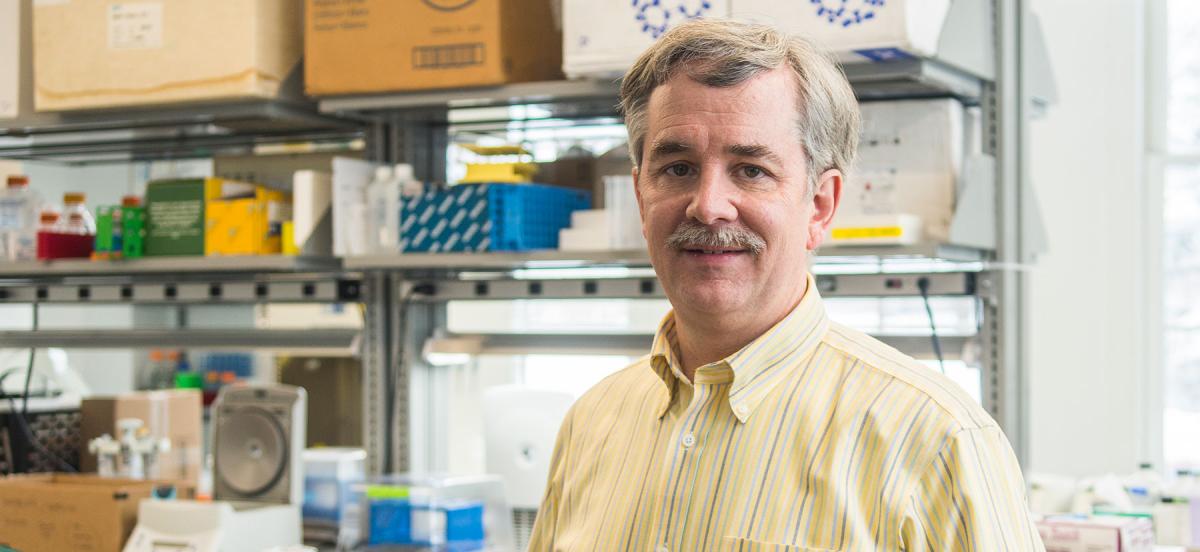Karl Johnson Awarded NIH Grant

Professor of Biology Karl Johnson in his lab. Photo by Patrick Montero.
Details
The Professor of Biology and Coordinator of the Concentration in Biochemistry and Biophysics has been awarded a $211,536 grant from the National Institutes of Health for his research on Chlamydomonas, a single-celled model organism that provides insight into the cell biology of many eukaryotes, including humans.
For Professor of Biology and Coordinator of the Concentration in Biochemistry and Biophysics Karl Johnson, researching Chlamydomonas, a type of single-celled, green alga, is the foundation for understanding more about cellular biology in all organisms, even humans. With a significant new grant from the National Institutes of Health, Johnson is looking forward to uncovering novel information about the role Chlamydomonas can play in learning the best practices and methods for gene editing in eukaryotic organisms—that is, those with complex cells, such as animals, plants, fungi, and algae.
"Previous work in Chlamydomonas has led to better understanding of basic biological processes that occur in all eukaryotes, including humans,” said Johnson. “This includes how normal cellular functions may be altered in disease. For example, basic research on how Chlamydomonas swims using a pair of thread-like projections called flagella/cilia set the stage for understanding a number of diverse human conditions now known as ciliopathies.”
Johnson’s project, “Precision Genomic Engineering of the Green Alga Chlamydomonas reinhardtii,” is slated to run for three years, from March 1, 2019 to February 28, 2022. The $211,536 grant will cover the cost of equipment and supplies to conduct the complex research into gene editing processes in this organism, and will also support the involvement of Haverford students as research fellows on the project.
"At this moment, four seniors already are making progress on senior thesis projects related to this project, and it is exciting to realize the impact this funding will have on the education and career interests of many additional Haverford students in the years to come,” said Johnson, who himself is a Tri-Co alumnus, having studied biology at Swarthmore College.
The main focus of Johnson’s research project is on the implications of gene editing in Chlamydomonas and the impact of this process on the studies of the broader science community.
"Being able to interrupt or otherwise rewrite the code of life is a powerful approach used in modern molecular biology to explore the functions of specific genes and the proteins that they may encode,” Johnson said. “It turns out that introducing a short piece of synthetic DNA into cells is sufficient to direct simple, specific changes, much like a word processor can find the word ‘CAT’ and replace it with ‘CUT’, and thereby dramatically change the meaning of the sentence in which that word occurs. While it is one thing to use such a tool, in the lab or on the computer, it is another to understand how it works, and these are complementary aspects of this project that we will be exploring over the next several years.”
The implications of Johnson’s research also have larger impacts for human society because of its environmental significance.
"Because Chlamydomonas also is a green cell,” he said, “there is great interest in using it as a model for understanding and improving important processes such as photosynthesis, crop productivity, solar-energy capture, and the conversion of carbon dioxide into useful products including new medicines and pharmaceuticals.”
Grateful to the National Institutes of Health for their funding, Johnson is excited about the results of the project following the next three years of study.
"Collectively, our research will provide powerful, new molecular tools that will be extremely valuable to the community of researchers working with Chlamydomonas and facilitate study of human disease models in this tractable organism."



